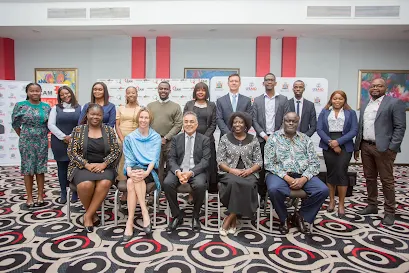ZAMBIA HAS POTENTIAL IN YOUTH SKILLS DEVELOPMENT-Mutati
By Daily News Reporter
Technology and Science Minister Felix Mutati has said that Zambia is on the right trajectory in breaking grounds through innovation and creativity, hence defining solutions through a strong built up novelty foundation of the ecosystem, for the country, as demonstrated by an innovative winner, Michael Sichilongo, who scooped the first prize project on his developed digital software App that define solutions for the physically challenged persons by using body gestures.
Speaking at the 2024 cohort of the young innovators ICT innovation programme, in Lusaka, were top Five finalists received awards, Mr. Mutati commended all innovators exhibited developed digital Applications and explained that Zambia is building a strong foundation in the innovation - ecosystem demonstrated by tangible outcomes: "It's a strong foundation that we are building in the innovation ecosystem, and the results we are showing, and thanks to you the young ones that are breaking new grounds."
He said Government has continued to invest in a robust and resilient digital infrastructure, with the current ongoing construction and installation of towers across the country, a national developmental digital transformation that will equally augment the innovation ecosystem.
The Minister urged the innovators to assess and catch up with emerging Artificial Intelligence technologies that will position their strength to supersede and cope with technical - know-how age.
Mr Mutati commended 'Lead Ebusaka' an innovative hub that has, over the years, grown and established a Twenty thousand customer - base from the scratch, an indication of limitless business proliferation in the power of creativity and innovation, hence timely addressing potent and sustainable solutions of the country's digital transformation journey.
He added that; Now, you heard Ebusaka are participating outside the country, under the theme called 'Tumbktoo,' and that's the way it's supposed to be."
Hon. Mutati further told the innovators and stakeholders that Zambia is among the Nine countries in Africa selected to host one of the themes of Timbuktoo, (an innovation initiative support programme by the United Nations Development Programme - UNDP).
He said the initiative will help innovators to develop transformative innovations for the respective countries, Zambia being branded under a theme, Mine Tech, whilst Nigeria will host under Fintech, and Rwanda, on Health Tech.
Mr. Mutati said the Zambian version Timbuktoo - Mine Tech ground breaking takes place (next week) to specifically execute the country's vision to scale up in responding to the delivery of Three Million tons production of copper bordering on a timeframe of Ten years, a challenge he pointed out owed to the innovators - ecosystem to realise the Mine - Tech devised visionary solutions.
The Minister put an emphasis on the public - private partnership and collaboration that were indispensable to help push innovators' energies to thrive. "You may wish to know, that Zambia outside South Africa is number Two, in terms of innovation, particularly raising startup capital, so we must be proud that we are doing something that is correct." He added.
Mr. Mutati, said Government is also carrying out critical amendments to the cyber security bill that will provide protection to the innovation and create an enabling legal framework.
Meanwhile, ZICTA director universal access, Collins Chomba said the presentation of the successive transformative initiative by young innovators is a recognition of their outstanding contributions for driving Zambia's progress through technology, entrepreneurship, and innovation.
Speaking on behalf of ZICTA director general, Mr Chomba said ZICTA launched the ICT in 2016 to create an ambitious programme to support the young innovators in commercialisng their ICT related ideas and startups.
"The programme aligns with the broader mandate under the ICT Act number 15 of 2009 to promote adoption, usage and local development of ICTs in the country." He read in his speech.
Mr. Chomba, further explained that since its inception, the ICT young innovators programme has provided technical and businesses developed support to over Four hundred and Fifty innovators, and of these Fourty have received direct financial support from ZICTA and cooperating partners, with a focus to enable them commercialise their respective innovation, a progress initiative that exists to scale up business in the creation of jobs, enhance service delivery, and contribute to solving existing social economic challenges.
And Nakana Mwamba from a nurtured startup, Lead Ebusaka, said the entity is a mobile and cloud based digital market place for waste management designed to transform how waste is collected, managed, and recycled through connecting households and businesses, ensuring transparency, efficiency, and environmental sustainability across the country.
And Stanbic head digital transformation, Yaza Kara, said the financial entity's strategy focuses on client satisfaction, digital transformation and SME growth.
She said the bank's agenda was not only to enhance service delivery through comprehensive online solutions but also its comittement to stimulate economic growth by promoting entrepreneurship
Meanwhile Airtel Networks Zambia, managing director, Kapa Kaumba, is grateful for her entity to be part of the unveiling prestigious ZICTA ICT, top Five, innovation programme as the network provider's growth strongly is underlined in its commitment to making a difference in the lives of people.
During the ceremony, other awardees include, Chama Mathews presenting a new hearing mobile app in the Fifth place, Mwiinga Nzala, a cost calculating farmer's project manager app in the Fourth place, and Malizyo Grabiel Muzumala, presenting a service automated medical interpretation in artificial intelligence on the Third slot.And in the second place, Nkonde Bupe, was unveiled in whose project visual operations simulations (VOS).






















